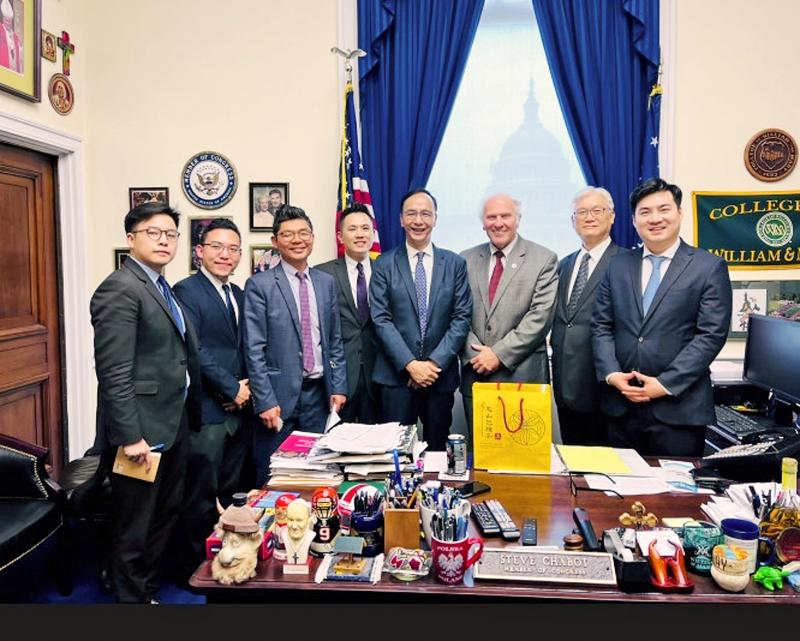Chinese Nationalist Party (KMT) Chairman Eric Chu (朱立倫) on Tuesday met with US National Security Council (NSC) officials and US lawmakers to discuss issues regarding Taiwan’s security and national defense.
Chu, who is on an 11-day trip to the US, said the meeting with NSC Senior Director for China and Taiwan Laura Rosenberger lasted about 45 minutes.
It was held at the American Institute in Taiwan’s Washington headquarters.

Photo courtesy of the Chinese Nationalist Party
They exchanged views on Taiwan’s security and national defense, including military service and the reserve force, Chu said.
The meeting showed that Washington places more focus on security issues, energy and technology than it did three years ago, Chu said, referring to his visit to the US in August 2019, shortly after he lost the KMT’s presidential primary for the 2020 election.
Chu visited Capitol Hill after the talks with Rosenberger for separate meetings with US representatives Don Bacon, Ruben Gallego, Lisa McClain, Michelle Steel and Steve Chabot, who chairs the US House of Representatives Taiwan Caucus, the KMT said.
Chu told McClain that the nation would require more arms that can boost its capabilities in the short term, as the nation is reforming its military and placing more focus on its reserve forces to resist potential external threats, the KMT said yesterday in a statement.
RISK OF WAR
Many experts and analysts estimate that there could be a conflict in the Taiwan Strait in the next five to 10 years, Chu said, adding that Taiwan and the US should strengthen joint defense training.
Chu discussed the nation’s semiconductor industry with Gallego, the statement said.
Chipmakers in Taiwan, South Korea and other allied nations should come together and work out a “common standard” to bolster global supply chains, Chu said, adding that he had conveyed the idea to the US government.

Taiwan has received more than US$70 million in royalties as of the end of last year from developing the F-16V jet as countries worldwide purchase or upgrade to this popular model, government and military officials said on Saturday. Taiwan funded the development of the F-16V jet and ended up the sole investor as other countries withdrew from the program. Now the F-16V is increasingly popular and countries must pay Taiwan a percentage in royalties when they purchase new F-16V aircraft or upgrade older F-16 models. The next five years are expected to be the peak for these royalties, with Taiwan potentially earning

STAY IN YOUR LANE: As the US and Israel attack Iran, the ministry has warned China not to overstep by including Taiwanese citizens in its evacuation orders The Ministry of Foreign Affairs (MOFA) yesterday rebuked a statement by China’s embassy in Israel that it would evacuate Taiwanese holders of Chinese travel documents from Israel amid the latter’s escalating conflict with Iran. Tensions have risen across the Middle East in the wake of US and Israeli airstrikes on Iran beginning Saturday. China subsequently issued an evacuation notice for its citizens. In a news release, the Chinese embassy in Israel said holders of “Taiwan compatriot permits (台胞證)” issued to Taiwanese nationals by Chinese authorities for travel to China — could register for evacuation to Egypt. In Taipei, the ministry yesterday said Taiwan

‘LIKE-MINDED PARTNER’: Tako van Popta said it would be inappropriate to delay signing the deal with Taiwan because of China, adding he would promote the issue Canadian senators have stressed Taiwan’s importance for international trade and expressed enthusiasm for ensuring the Taiwan-Canada trade cooperation framework agreement is implemented this year. Representative to Canada Harry Tseng (曾厚仁) in an interview with the Central News Agency (CNA) said he was increasingly uneasy about Ottawa’s delays in signing the agreement, especially as Ottawa has warmed toward Beijing. There are “no negotiations left. Not only [is it] initialed, we have three versions of the text ready: English, French and Mandarin,” Tseng said. “That tells you how close we are to the final signature.” Tseng said that he hoped Canadian Prime Minister Mark Carney

POSITIVE DEVELOPMENT: Japan and the US are expected to hold in-depth discussions on Taiwan-related issues during the meeting next month, Japanese sources said The holding of a Japan-US leaders’ meeting ahead of US President Donald Trump’s visit to China is positive news for Taiwan, former Japan-Taiwan Exchange Association representative Hiroyasu Izumi said yesterday. After the Liberal Democratic Party’s landslide victory in Japan’s House of Representatives election, Japanese Prime Minister Sanae Takaichi is scheduled to visit the US next month, where she is to meet with Trump ahead of the US president’s planned visit to China from March 31 to April 2 for a meeting with Chinese President Xi Jinping (習近平). Japan and the US are expected to hold in-depth discussions on Taiwan-related issues during the